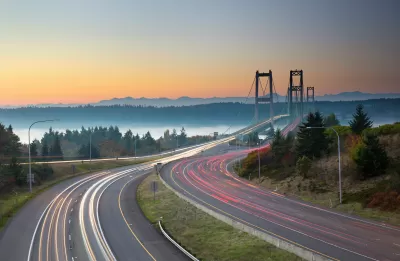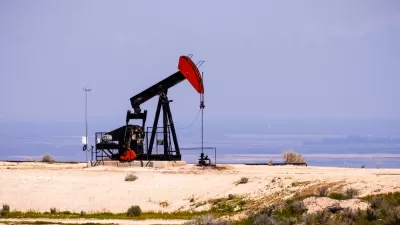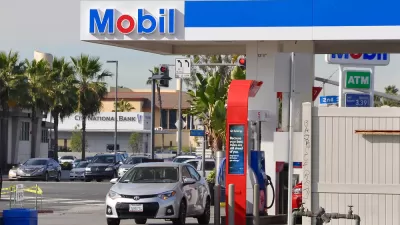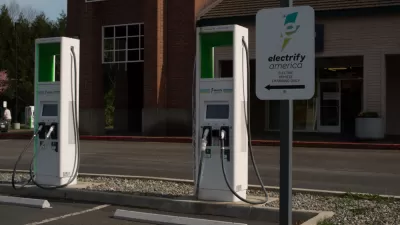For the second time in two years, Gov. Jay Inslee has dealt a legislative setback to transportation planning efforts to prepare for the 2035 ban on the sale of gas-tax paying light duty motor vehicles to reduce carbon emissions.

On May 13, 2021, Washington Gov. Jay Inslee vetoed a section of a transportation electrification bill because it was linked to a mileage fee that would enable electric vehicle owners to pay for road upkeep based on the miles they drove, similar to the per-gallon fuel tax.
Two years later, on May 15, Gov. Inslee vetoed a bill “that would have required the state to ask drivers to volunteer their odometer readings, a precursor to a long-discussed and still theoretical tax on miles traveled that could replace Washington’s tax on gasoline,” reported David Kroman who covers transportation for The Seattle Times on May 16 (source article).
Under the bill, drivers would not have been required to provide their readings to the Department of Licensing. Rather, it was intended as a data gathering exercise with the goal of “gaining more accurate information on vehicle miles traveled in the state” in preparation for the possible tax, often called a road-use charge.
According to House Bill 1736 [pdf], “the legislature finds it necessary to collect motor vehicle mileage information through the reporting of annual odometer readings...to further state transportation planning efforts.”
“Chair of the House Transportation committee, Rep. Jake Fey, D-Tacoma, said he was surprised and disappointed by the veto,” adds Kroman.
“It seemed to be helpful information at a minimal cost,” he said.
Still, it’s not a “fatal blow” to a road-use charge, he said, and the Legislature would keep talking with Inslee’s office to understand his concerns.
It should be clear to mileage fee advocates from the governor's veto message [pdf] that Inslee is unwilling to support the concept of charging drivers by the mile they drive. He wrote on May 16:
Although voluntary, requesting this information from vehicle owners presupposes a future per-mile program as an alternative transportation funding mechanism. Yet, there is a need to consider both a per-mile fee program as well as broader options for alternative funding sources for transportation.
The good news from a transportation planning perspective is that Inslee “is not seeking a fourth term and will vacate his office at the end of 2024,” according to Kroman.
Nevada does it
Nevada, another state considering transitioning to a road usage charge, already obtains the odometer information, though using a different approach, based on somewhat similar legislation that passed four years ago.
[See: Nevada to Embark on 7-Year Program to Record Mileage of Motorists, August 30, 2019]
Preparing for 2035
Washington is one of six states (the others being Maryland, Massachusetts, New Jersey, New York, Oregon), according to Dan Avery of CNET on May 4, 2023, that adopted California's Advanced Clean Cars II rule that requires banning the sale of internal combustion engine light duty vehicles by 2035, with the first threshold being 2026 when at least one-third of new light duty vehicles sold must be zero-emissions.
Related posts:
- Oregon to End Sales of Gas-Powered Vehicles by 2035, December 23, 2022
- Will California's EV Rule Spread to Other States? September 7, 2022
- The Beginning of the End of the Internal Combustion Engine Vehicle? August 29, 2022
Gas tax revenues and inflation
With state fuel taxes comprising a major part of state transportation budgets, the drop in transportation funds is foreseeable. Unlike California, which automatically increased its gasoline tax by 4 cents-per-gallon on July 1 due to an inflation index adjustment in 2017 legislation, Washington state is not among the “22 states and Washington, D.C., [that] have a variable-rate gas tax that adjusts, to some degree, with inflation or prices without regular legislative action,” according to the National Council of State Legislatures as of July 14, 2021.
Gas prices, climate legislation
Washington's gas tax of $.494 per gallon has remained unchanged since July 2016, a result of a 12-cents per gallon increase signed into law a year earlier. In January of this year, the state added a new carbon fee to gasoline, a result of the 2021 Climate Commitment Act, a 'cap-and-invest' program, which may, in part, account for Washington having the nation's highest gas price ($4.965 per gallon, ten cents higher than California on July 8 per AAA), according to The Seattle Times on June 21.
Experts say Washington’s price surge is linked to the state’s latest, most ambitious efforts to battle climate change, specifically the new carbon-pricing program launched this year that charges businesses for the greenhouse gases they emit. The first two quarterly auctions of emission allowances raked in more than $850 million.
Related posts (in addition to those shown below):
- National Mileage Fee Pilot Program Late to Launch, June 29, 2023
- Washington State Considering New Gas Tax, Transit and Bike Fees, February 26, 2021
- Washington State to Decide on Transition From Gas Tax to Road Usage Charge, August 15, 2019
Hat tip to Julie Carr Smyth of The Associated Press who reported on the Inslee veto in her piece (posted here).
FULL STORY: Inslee vetoes collection of WA drivers’ odometer readings

Planetizen Federal Action Tracker
A weekly monitor of how Trump’s orders and actions are impacting planners and planning in America.

Map: Where Senate Republicans Want to Sell Your Public Lands
For public land advocates, the Senate Republicans’ proposal to sell millions of acres of public land in the West is “the biggest fight of their careers.”

Restaurant Patios Were a Pandemic Win — Why Were They so Hard to Keep?
Social distancing requirements and changes in travel patterns prompted cities to pilot new uses for street and sidewalk space. Then it got complicated.

Platform Pilsner: Vancouver Transit Agency Releases... a Beer?
TransLink will receive a portion of every sale of the four-pack.

Toronto Weighs Cheaper Transit, Parking Hikes for Major Events
Special event rates would take effect during large festivals, sports games and concerts to ‘discourage driving, manage congestion and free up space for transit.”

Berlin to Consider Car-Free Zone Larger Than Manhattan
The area bound by the 22-mile Ringbahn would still allow 12 uses of a private automobile per year per person, and several other exemptions.
Urban Design for Planners 1: Software Tools
This six-course series explores essential urban design concepts using open source software and equips planners with the tools they need to participate fully in the urban design process.
Planning for Universal Design
Learn the tools for implementing Universal Design in planning regulations.
Heyer Gruel & Associates PA
JM Goldson LLC
Custer County Colorado
City of Camden Redevelopment Agency
City of Astoria
Transportation Research & Education Center (TREC) at Portland State University
Camden Redevelopment Agency
City of Claremont
Municipality of Princeton (NJ)





























